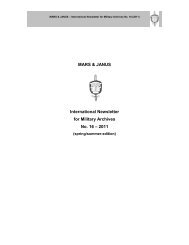National Experiences - British Commission for Military History
National Experiences - British Commission for Military History
National Experiences - British Commission for Military History
You also want an ePaper? Increase the reach of your titles
YUMPU automatically turns print PDFs into web optimized ePapers that Google loves.
246 ai r p o w e r in 20 t H Ce n t u ry do C t r i n e s a n d em p l o y m e n t - nat i o n a l ex p e r i e n C e s<br />
the logisticians and the administrative with the necessary skills to face the situation<br />
in the overseas.<br />
The operation and maintenance of aircraft required trained personnel to achieve<br />
the objectives imposed by the war in acceptable levels of flight safety, and not being<br />
very easy this was achieved in a satisfactory way, particularly in those units where it<br />
was possible to maintain a good framing of its staff. The roughness of the operation<br />
and maintenance required special care to avoid growing risk situations. As important<br />
as the material conditions were the psychological conditions, the psychological<br />
preparation of the combatants and the support of the Nation – the war had these two<br />
fronts, equally important.<br />
The guerrillas cannot dispose of air power, <strong>for</strong> reasons inherent in the nature of<br />
war and because they are conspicuous, and this is one of the characteristics, among<br />
many others, that distinguishes this type of war from the conventional war. Air power,<br />
when used correctly, in this operational context, is a factor of imbalance because<br />
it explores the third dimension in an engaging <strong>for</strong>m, in terms of visibility, penalty<br />
or flagellation, creating uncertainty and insecurity, and also in terms of support of<br />
populations. Competition <strong>for</strong> security of the people was one of the objectives of both<br />
parties in conflict.<br />
The counter-guerrilla war cannot require highly sophisticated means, but most<br />
important is to maintain presence, and create insecurity to the guerrillas and populations<br />
supporting them, and at same time conquering populations through cooperative<br />
actions allowing an improvement of living conditions – in this context, air assets<br />
play an important role. It is normally said that the main objective of the guerrilla is to<br />
wear out conventional <strong>for</strong>ces which is true, but the fact remains that the guerrilla also<br />
wears out if continued pressure on their <strong>for</strong>ces is exerted and psychological action<br />
influences the populations cutting off support to the guerrilla, if they have an alternate<br />
way. It is also possible to degrade the will to fight on the guerrilla side, although<br />
we have to recognize that this involves remarkable costs.<br />
The counter guerrilla demands, in a strong way, the exploitation of the characteristic<br />
of flexibility and versatility of the aerial means. For instance, in the Portuguese<br />
case, aircraft designed <strong>for</strong> maritime patrol were used as a means of ground attack,<br />
close support or medical evacuation and even transportation. Aircrafts <strong>for</strong> general<br />
transportation was leveraged <strong>for</strong> attack and recognition. Airplanes of instruction<br />
were adapted as ground attack aircraft – the T-6 was the close support airplane to the<br />
ground <strong>for</strong>ces most used in all theatres, with very positive results. The tactical mobility<br />
of <strong>for</strong>ces, which was achieved through helicopters, was crucial to the success of<br />
many operations; the coordination of this manoeuvre with fire support provided by<br />
conventional aircraft and jet fighters, reached levels of remarkable precision.<br />
As demonstrated by the facts, Air Power is a factor of imbalance in guerrilla warfare,<br />
by having access to all parts of the theatre, making the creation of sanctuaries,<br />
which were indispensable to the guerrillas, very difficult, <strong>for</strong> the ability to observe,



